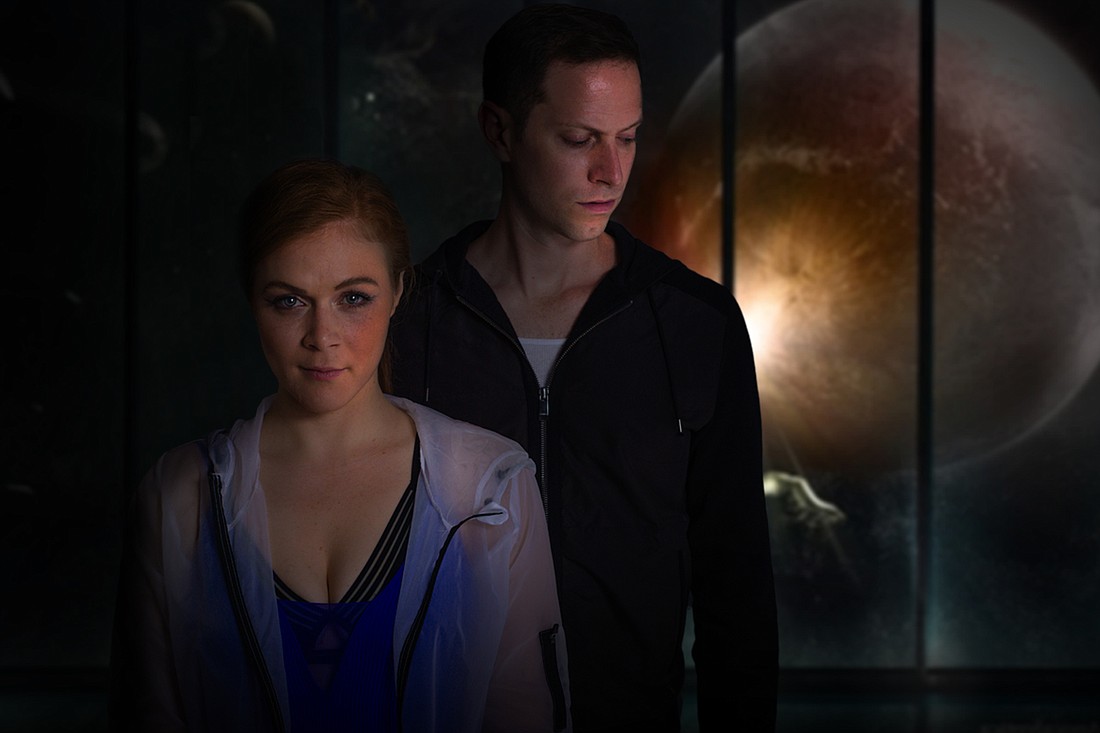- November 23, 2024
-
-
Loading

Loading

Urbanite Theatre has taken area audiences on journeys to post-apocalyptic urban wastelands, the haunts of a Victorian serial killer, through the twists and turns of a blue-collar odyssey and into the cold conference room at the heart of a murderous conspiracy.
With the upcoming production
of Claire Kiechel’s “Pilgrims,” it will explore the final frontier: space.
That voyage began with an intriguing email. To director Carl Forsman, it had the most unusual subject line he’d ever read.
“Have you ever directed a play set in outer space?”
A far-out question, but Forsman knew it wasn’t spam. The email came from Daniel Kelly, an Urbanite associate and one of his former pupils at the University of North Carolina School of the Arts. So he read the email. After that, he opened the attachment — and read Kiechel’s script.
Her play put a new twist on the science-fiction trope of colonists on a voyage to a new world. Kiechel’s protagonists were a soldier and a teenaged girl. (Called simply the Girl and the Solider in the script.)
When a disease broke out, their ship locked down. The Girl and the Soldier found themselves quarantined in the same cabin, where they’d be stuck with each other (and an obsolete android) for a long time. A classic locked-door situation.
Forsman was moved by what unfolded when the two were bottled up together. It was a tale of raw emotion, painful revelation and a profound understanding of the human heart. Although Kiechel’s play is set in the future, it deals with a problem as old as Homer’s “Odyssey.” Post-traumatic stress disorder.
The Soldier and the Girl were both damaged goods. He’d been traumatized by combat. She’d been mentally wounded by rape. Both long to escape their past, whether through fantasy, isolation or human connection.
Forsman finished reading the script and replied to Kelly’s email. His answer was yes.
“I’ve been a science fiction fan all my life,” he says. “But the sci-fi genre and live theater don’t often come together. This offered a rare opportunity to do a character-centered play set in a futuristic milieu.”
The playwright’s use of language also intrigued the director. The words on the page read like free verse. Sentence fragments, ellipses and anacoluthons. All punctuation-free.
“Kiechel is the master of the incomplete thought,” says Forsman. “Her characters struggle to express themselves — and to be themselves. They’ve both experienced serious trauma. They deal with it by playing parts and putting on masks.”
The playwright’s story deals with the different ways men and women handle trauma. The Soldier is forced to share his cabin, and he’s furious. He just wants to withdraw, shut down and not talk to anybody. The Girl wants to make a human connection and get the pain out of her system.
Beneath the wildly different reactions, the pain that drives them has a harsh similarity.
“When they break through their barriers, it’s shocking how much the Solider and the Girl have in common,” notes Forsman.
He adds that rehearsals have been a challenge. And a long, strange trip.
“The playwright leaves so much unsaid — and that sets a very high bar for the actors. They have to flesh out the empty spaces, and they love it. Theater is an actors’ medium, and they get a chance to show what they can do.”
Brendan Ragan, the Urbanite’s co-artistic director, will portray the Soldier.
“I think setting the play in space was a brilliant choice,” he says. “Humanity can travel to the stars and build convincing androids, but we still can’t talk about our feelings in an honest and open way.”
Cameron Morton plays Jasmine, the obsolete stewardess android programmed for passenger comfort and comic relief.
“Cameron was my student at NCSA last year,” says Forsman. “She’s a wonderful, beautiful, talented young lady, and not afraid to embarrass herself. That’s crucial when you’re playing a slightly dysfunctional robot.”
Betsy Helmer is the Girl. “She’s the engine of the play — the motor driving it forward,” says Forsman. “We’re making sure we approach the material in a respectful way.”
He explains that Kiechel’s play has a few scenes involving nudity and physical contact. Fight directors Dan Granke and Selena Vela will also provide intimacy coaching — a new theatrical specialty devoted to preventing emotional damage during intimate scenes.
Forsman isn’t directing the material in a science-fiction style. It’s a story that happens to be set in space, that’s all. He’s taking a gut-level, realistic approach.
“This isn’t a play about two bad roommates fighting with each other,” he says. “It’s about two people trying to connect. How do they negotiate the difficulty of their relationship and not give up? There’s a relentlessness of their pursuit of each other.”